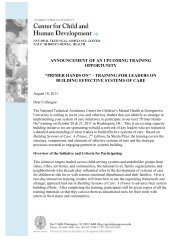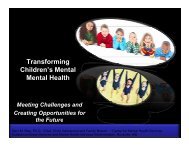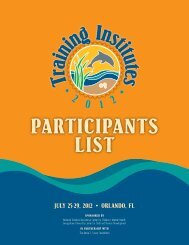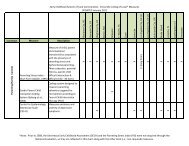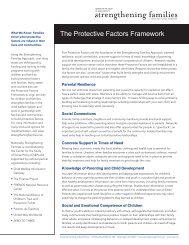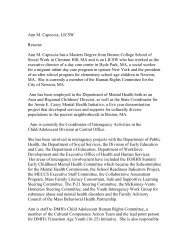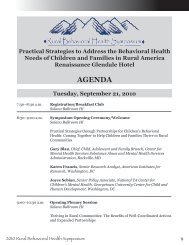Training Institutes 2012 - National Technical Assistance Center for ...
Training Institutes 2012 - National Technical Assistance Center for ...
Training Institutes 2012 - National Technical Assistance Center for ...
Create successful ePaper yourself
Turn your PDF publications into a flip-book with our unique Google optimized e-Paper software.
demonstrations will be used to illustrate different strategies to promote and communicate a resiliency initiative. The<br />
faculty team <strong>for</strong> the session will offer the perspectives of a clinician, a family member, a youth, and a family advocate.<br />
MODERATOR/PRESENTER: Richard Shepler, Ph.D., P.C.C.-S., Senior Research Associate, <strong>Center</strong> <strong>for</strong> Innovative<br />
Practices, Begun <strong>Center</strong> <strong>for</strong> Violence Prevention, MSASS, Case Western Reserve University, North Canton, OH<br />
Tracee Black-Fall, Executive Director, Tova’s N.E.S.T., Columbus, OH<br />
Terre Garner, Executive Director, Ohio Federation <strong>for</strong> Children’s Mental Health, Cincinnati, OH<br />
Ashley Harris, Youth Coordinator, Ohio Federation <strong>for</strong> Children’s Mental Health, Cincinnati, OH<br />
INSTITUTE #11 1:30 PM THURSDAY • 8:30 AM SATURDAY • MIAMI 1-2<br />
INSTITUTES<br />
Ensuring Language Access in Your Organization<br />
OBJECTIVES—Participants will learn:<br />
1. To describe current and emergent demographic trends <strong>for</strong> languages other than English spoken in the U.S.<br />
2. To define a framework <strong>for</strong> linguistic competence and its application within their organizations<br />
3. To identify legal responsibilities <strong>for</strong> the provision of language access services to individuals with limited English<br />
proficiency under Title VI of the Civil Rights Act of 1964<br />
4. To cite unique issues and list areas of knowledge and specific skills necessary <strong>for</strong> interpreting in behavioral health<br />
5. To describe lessons learned and best practices from a statewide ef<strong>for</strong>t to improve language access to behavioral<br />
health services<br />
Ensuring that services are available <strong>for</strong> linguistically diverse populations in the U.S., its territories, and in tribal<br />
communities is of critical importance to ensure equal access, improve quality and effectiveness of care, reduce<br />
disparities, and to comply with federal law. This Institute will offer specific guidelines and practical in<strong>for</strong>mation on how<br />
to ensure language access within the context of behavioral health services <strong>for</strong> children, youth, and their families. Faculty<br />
will highlight the range of strategies necessary to implement and evaluate linguistically competent services including<br />
policies, structures, practices, procedures, behaviors, attitudes, and dedicated resources.<br />
The content, strategies, and approaches that will be offered during the Institute, designed to ensure language access in<br />
behavioral health, are based on the collective knowledge and experiences of the <strong>National</strong> <strong>Center</strong> <strong>for</strong> Cultural<br />
Competence of the Georgetown University <strong>Center</strong> <strong>for</strong> Child and Human Development, the <strong>National</strong> Asian American<br />
Pacific Islander Mental Health Association, the <strong>National</strong> Latino Behavioral Health Association, the Office <strong>for</strong> Civil<br />
Rights of the U.S. Department of Health and Human Services, and the State of New Mexico.<br />
Faculty will use multifaceted approaches to meet its objectives and engage the audience in exploring the following<br />
topical areas:<br />
• Application of a linguistic competence framework<br />
• Title VI of the Civil Rights Act of 1964 legal requirements<br />
• Unique challenges of providing interpretation services in behavioral health care<br />
• A state example of ef<strong>for</strong>ts to improve language access in behavioral health services<br />
• Social-political climates in many states and communities that impact the language access services including “English<br />
Only” laws, inadequate funding, and discriminatory attitudes and practices directed against non-English<br />
speaking populations<br />
Faculty will elicit the greatest challenges faced by members of the audience who have responsibility <strong>for</strong> or are<br />
implementing language access services to ensure that individual and group concerns are addressed. The Institute will<br />
also offer brief lecturettes, a role play exercise, a Jeopardy game featuring “Ask OCR” (Office <strong>for</strong> Civil Rights), an<br />
individual action planning template to take home to support the enhancement of language access services, and ample<br />
opportunity <strong>for</strong> questions, answers and discussion.<br />
<strong>Training</strong> <strong>Institutes</strong> <strong>2012</strong><br />
43



